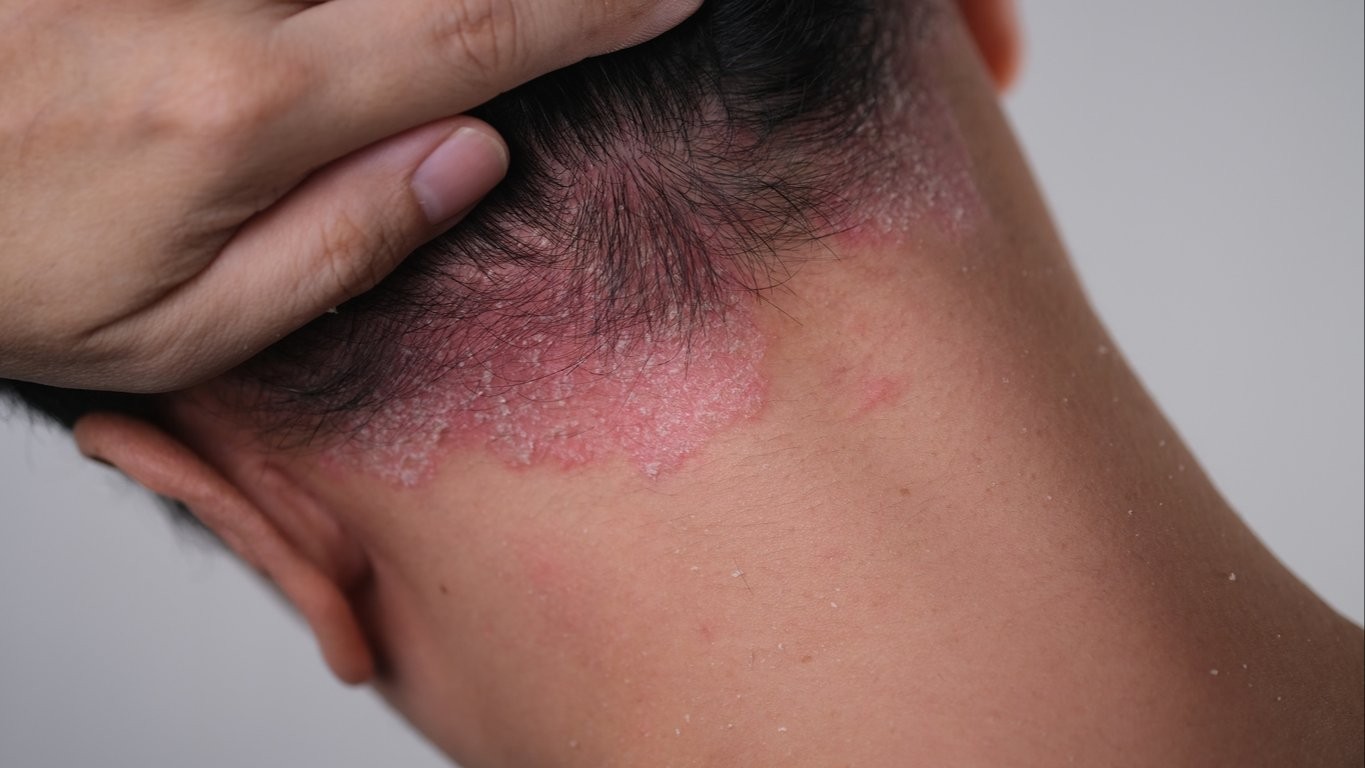Plaque psoriasis is a common chronic autoimmune condition that affects the skin, resulting in inflamed, red patches covered with a silvery or white buildup of dead skin cells. These patches, known as plaques, can occur on various parts of the body, including the scalp, elbows, knees, and lower back. It’s a lifelong condition that can be managed with the right treatment and care.

What Causes Plaque Psoriasis?
The exact cause of plaque psoriasis is unknown, but research suggests that it is related to an overactive immune system that accelerates the production of skin cells. Typically, new skin cells form and replace old ones in a cycle of about 28-30 days. However, in people with psoriasis, this process speeds up to just a few days, leading to an accumulation of dead cells on the surface of the skin.
Several factors are known to contribute to the onset of plaque psoriasis:
- Genetics: A family history of psoriasis increases the risk of developing the condition.
- **Immune System Dysfunction:** An abnormal immune response triggers rapid skin cell growth.
- Environmental Triggers: Stress, infections, and certain medications can trigger or worsen symptoms.
For a comprehensive explanation of psoriasis and its causes, read more on the Mayo Clinic website.
What Scalp Psoriasis Looks Like
Scalp psoriasis is a specific type of psoriasis that affects the scalp, appearing as red, scaly patches. These patches can be mild or cover larger areas, extending to the forehead, neck, and even behind the ears. The scales on the scalp are often thicker than those in other areas, and symptoms may include severe itching and dandruff-like flaking.
If you want to learn more about how scalp psoriasis presents, visit Cleveland Clinic – Scalp Psoriasis.
What Causes Scalp Psoriasis?
Scalp psoriasis shares similar causes with other forms of psoriasis. It is primarily triggered by an overactive immune system that mistakenly attacks healthy skin cells, leading to their rapid production. Environmental factors such as stress, weather changes, and infections can also contribute to flare-ups. People with a family history of psoriasis or other autoimmune disorders are at a higher risk.
For more information on what causes scalp psoriasis, check out the detailed article on WebMD.
Scalp Psoriasis Common Causes
Several factors are known to contribute to scalp psoriasis. These include:
- Genetics: A family history of psoriasis or autoimmune diseases increases the likelihood of developing scalp psoriasis.
- **Stress:** High levels of stress can trigger flare-ups or worsen existing symptoms.
- **Infections:** Bacterial or viral infections can prompt the immune system to overreact, leading to inflammation on the scalp.
- Medications: Certain drugs, such as beta-blockers, antimalarials, or lithium, can trigger or worsen symptoms.
For a deeper dive into these common causes, explore the resources at American Academy of Dermatology.
Scalp Psoriasis First Signal
The first signal of scalp psoriasis is typically persistent itching, followed by the appearance of red patches or scales on the scalp. These patches might resemble severe dandruff, but they are often thicker and accompanied by soreness or a tight sensation on the scalp. If left untreated, the condition can worsen and lead to more widespread plaques.
Early recognition of these symptoms is crucial for managing the condition effectively. For more about the first signals and symptoms, visit the UCLA Health website.
What Causes Psoriasis of the Scalp? It’s Not What Most People Think
Many misconceptions surround the causes of scalp psoriasis. Contrary to popular belief, poor hygiene or excess oil production isn’t the root cause. Instead, scalp psoriasis is primarily the result of an overactive immune system that accelerates skin cell growth. This immune response can be triggered by genetic predisposition, environmental stressors, and certain medications.
It’s essential to understand that psoriasis of the scalp is not contagious, and it cannot be spread by touching the affected areas or sharing personal items.
Do You Know What Scalp Psoriasis Is? (Take a Look)
Scalp psoriasis is a chronic inflammatory condition that affects the scalp, causing the formation of red, scaly patches. These patches can range from mild to severe, with symptoms such as intense itching, flaking, and discomfort. It’s crucial to distinguish scalp psoriasis from other conditions like seborrheic dermatitis, as the treatment approaches can differ significantly.
For more insights into what scalp psoriasis is and how it can be managed, refer to the comprehensive guide on WebMD.
Do You Know What Plaque Psoriasis Is? (Take A Look)
Plaque psoriasis, the most common form of psoriasis, is characterized by raised, red patches covered with silvery-white scales. It can occur on various parts of the body, including the scalp, elbows, knees, and lower back. The severity can vary, with some people experiencing mild patches while others suffer from extensive and painful plaques.
Understanding plaque psoriasis is crucial to seeking the right treatment. Early diagnosis and intervention can prevent complications and provide relief from symptoms. For more details on what plaque psoriasis is, visit Mayo Clinic.
Managing Plaque and Scalp Psoriasis
Effective management of plaque and scalp psoriasis involves a combination of lifestyle changes, medications, and topical treatments. Common treatment options include:
- Topical Treatments: Creams and ointments containing corticosteroids, vitamin D analogues, or coal tar can help reduce inflammation and slow skin cell production.
- Phototherapy: Light therapy or phototherapy involves exposing the skin to ultraviolet (UV) light under medical supervision.
- **Systemic Medications:** For severe cases, oral or injectable medications may be prescribed to regulate the immune system.
- **Lifestyle Changes:** Stress management, a healthy diet, and regular moisturizing can help minimize flare-ups and discomfort.
For a detailed look at treatment options for scalp psoriasis, you can refer to Cleveland Clinic.
Plaque psoriasis, including its manifestation on the scalp, can be a challenging condition to manage. However, understanding its causes, symptoms, and early signs can help individuals take proactive steps toward managing the condition effectively. With a range of treatment options available, it’s possible to control symptoms and improve the quality of life for those affected by psoriasis.
By seeking medical advice and exploring available treatment options, individuals with plaque and scalp psoriasis can achieve better outcomes and minimize the impact of this chronic condition on their daily lives.




